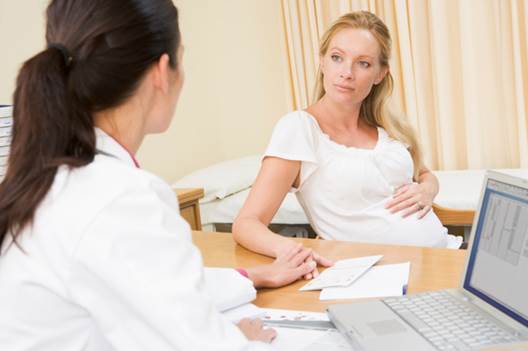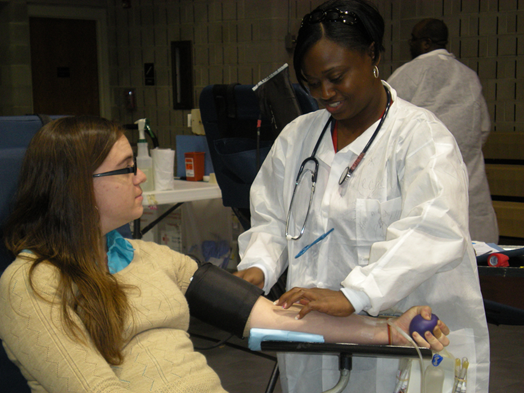One of the things that make pregnant women
worried the most is the risk of miscarriage.
According to estimates, one out of five
pregnant women has miscarriage around their 3 first months of pregnancy.
However, you can minimize the risk of miscarriage if you have better knowledge
about the reason of it.
Abnormal chromosome
This is the popular reason of miscarriage.
When eggs meet sperm, it could be due to defective eggs or sperms that the
chromosomes don’t match properly. In that case, the fertilized embryos will
have chromosome abnormalities and the pregnancy will end soon. On other words,
it means miscarriage.
What
to do

If
you have another miscarriage, you should think about taking chromosome tests.
You still have chance to have safe
pregnancy and healthy babies after the first miscarriage. However, if you have
another miscarriage, you should think about taking chromosome tests to know
whether the reason of your miscarriage is chromosome abnormalities. If your
chromosomes are normal, doctors will consult you and help you find out the
reason of your successive miscarriages.
Uterus and cervix issues
Some birth defects in the uterus, cervical
septum and serious stuck uterine issues can prevent embryos building their
implantations on the uterine wall or in case they’ve already had the
implantations they can’t receive enough nutrient to survive, which leads to
miscarriage.
The cervix which is weak or usually short
(cervical failure) hardly keeps fetuses stay in the uterus at the end of the
first trimester when fetuses are big enough to affect the cervix.
What
to do
You should see a doctor to have uterine and
cervical checks. If there’s cervical septum, it can be removed by surgeries. In
case of weak cervix, it can be fixed by temporary cervical surgeries.
History of miscarriage
Women who have miscarriage successively
twice or more have higher risk of miscarriage than other women.
What
to do

It’s
necessary to be calm and relaxed.
·
Avoid doing hard work, spend more time resting
but remain small activities to help the body be healthy.
·
Have daily supply that provides enough
nutrients, especially iron, magnesium, B6…
·
It’s necessary to be calm and relaxed.
·
After a miscarriage, wait 6 months to 1 year for
the genitalia to completely amend before getting pregnant again.
The age
Miscarriages tend to increase through
pregnant women’s ages. In fact, the risk of miscarriage can increase to 15% to
women who are over 35 years old; the risk is 20-35% to women who are 35-45.
And, women who are over 45 years old have the most risk of miscarriage.
A part from the risk of miscarriage,
fetuses of women who are over 35 years old often have birth defects, the risk
of Down and other defects.
What
to do
You’d better have children when you’re
22-29 years old. At that time, the body has fully developed and the eggs are
also at is best condition, which can reduce the risk of miscarriage. On the
other hand, women in those ages are spiritually ready for getting pregnant and
having children.
If you have children when you’re over 35
years old, you need to keep tract of fetal developments by having recurring
pregnancy tests directed by your doctor. You also have to pay more attention on
your diets and exercises.
Infectious diseases
The risk of miscarriage will get higher if
pregnant women have listeria, mumps, rubella, measles, cytomegalovirus
infection, parvovirus infection, gonorrhea, AIDS and other infectious diseases.

You
should have immunization to prevent some diseases before pregnancy.
What
to do
Before getting pregnant, you need to have
general health examinations to know your health state and prepare for
pregnancy.
You should have shots of flu, measles,
rubella… before reaching the third month of pregnancy.
Drinking and smoking habits
Smoking or inactive smoking is harmful to
fetuses. In tobacco smoke, there’re thousands of chemicals in which there’re
substances that harmful to reproductive health, such as benzene and cadmium.
What
to do

You
should stop smoking and drinking when pregnant.
To have a healthy and safe pregnancy, you
should stop smoking, drinking and stay away from places that have tobacco
smoke.
Chronic diseases and disorders
Diabetes that is not under good control,
genetic coagulopathy, immune disorders ( anti-phospholipid syndrome – severe coagulation
or Hughes; Systemischer Lupus erythematodes) and hormonal disorders (polycystic
ovary syndrome) are some of the reason of the increase of miscarriage.
What
to do
·
Limit eating calorie, carbohydrate and have
regular exercise.
·
Have recurring pregnancy checks.
Diet
When pregnant, the diet plays an important
role in fetal developments. Having anemia and folic acid deficiency are some of
the reason of malnutrition and miscarriage. Besides, eating too much foods like
aloe, wormwood leaves, green papaya, animal livers… also increase the risk of
miscarriage.

A
healthy regimen can help pregnant women prevent miscarriage.
What
to do
When pregnant, women need to have balance
diets, iron and acid folic pills to prevent anemia and acid folic deficiency. Women
should have nutrition supplies before getting pregnant. Therefore, they should
spend 3-6 months preparing for pregnancy.
Take medicine arbitrarily
There’re some pills whose elements are able
to increase the risk of pregnancy. Hence, pregnant women shouldn’t take
medicine without prescription.

You
should never take medicines without doctor’s prescription.
Even the drugs that you take is tonics or vitamin
pills, you should never buy or drink them without prescription. That’s because
doctors will base on the results of your pregnancy tests to give you
prescriptions about the tonics and vitamins you need, so if you have increase
the amount of nutrient absorption buy taking more pills arbitrarily, it can
cause you side effects.
Traumas
The miscarriage is also caused by traumas,
such as accidents, carrying heavy things, doing strong movements, often using
stairs, going away…
What
to do
·
You should do gentle movement, avoid traumas and
serious collisions.
·
Do not carry heavy things
·
Traveling by taxis or buses for safety reason
·
When having abnormal signs like abdominal pain,
vaginal bleeding, cramps, pelvic pressure…, you should see a doctor to have
timely interventions.